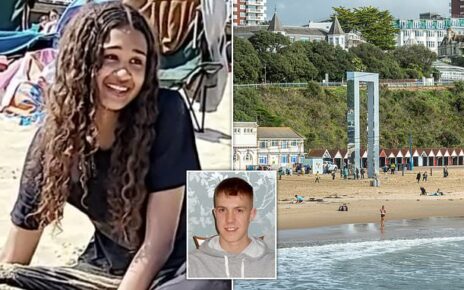LOCAL thrillseekers last night ignored warnings from local officials to get a glimpse of Iceland's erupting volcano up close.
The Grindavik volcano finally erupted on Monday, spewing molten lava 330 feet into the air from a fiery crevice over two miles long.
Shocking footage captured the volcano exploding as burning red plumes of fire and smoke poured into the black sky.
After weeks of concerning earthquakes and a crack even opening up in the nearby town, the volcano finally burst.
Now shocking pictures have emerged of dozens of people gathering near the fiery spectacle to watch lava pour down the mountain.
Almost 4,000 people were evacuated from the nearby town of Grindavik in recent days amid fears they would be at risk from the long anticipated eruption.
READ MORE ON ICELAND VOLCANO

Moment Iceland volcano erupts sending molten lava billowing into sky

Brit in Iceland films house shaking as lava pool under town 'ready to blow'
But government officials were forced to repeatedly warn people wanting to get close to the volcano.
One spokesperson said: "Think about someone other than yourself and follow the guidelines of the public safety. Please".
Iceland cops also added: "An eruption has begun.
"We ask people not to be in front of the responders and not to go in the direction of the eruption.
Most read in The Sun

Shocking moment car flips over & ploughs into path of mum pushing child in pram

Ruth Langsford breaks down in tears as she admits having her ‘heart ripped out’

TV legend Esther Rantzen, 83, may end life at Dignitas after cancer battle

Pete Wicks breaks silence on ‘bedding I’m A Celebrity wives’ after boozy nights
"It is important that roads and other things are as accessible as possible."
The eruption ripped open a 2.5 mile-long crack in the surface of the volcano, which at one end is only three kilometres from local town Grindavik.
Grindavik itself is only 25 miles southwest of Iceland's capital Reykjavik.
A government spokesperson previously said: "The eruption does not present a threat to life".
The lava is appearing to flow away from Grindavik instead of towards it, giving residents and officials hope for minimal disruption.
Local geologist Bjorn Oddson told Icelandic media RUV: "The eruption is taking place north of the watershed, so lava does not flow towards Grindavik".
This is the volcano's fourth eruption in just two years.
One tourist from the US, Robert Forrester, who wanted a closer look,said it was like "something from a movie".
Four boys told local media that they always go to watch eruptions in the local area and said: "We are trying to see the eruption.
"Unfortunately, we didn't get any closer. It's a hobby that we've had for four years, attending every single eruption, and we'll continue to do so."
Iceland is seen as a seismic and volcanic hot spot as the two plates – Eurasian and North American – move in opposite directions.
The country declared a state of emergency after recent concerns increased, with the UK foreign office warning that "no travel can be guaranteed safe".
Halldor Geirson, an associate professor at the Institute of Earth Sciences at the University of Iceland, warned that the eruption "could potentially go on for several months".
He also said it could "just stop later today or tomorrow".
Geirson warned that there "is still a threat" to Grindavik.
Reykjavik is also at risk of gas pollution tonight or tomorrow as a result of the eruption, Iceland's Met Office warned.
A statement said: "According to the weather forecast, gas pollution could be noticed in the capital area late tonight or in the morning.
"New work is being done on a hazard assessment card and it will be issued later today."
Tourists have anxiously waited to see if travel in and out of Iceland would be affected by Monday's eruption.
But a government spokesperson said on Tuesday: "There are no disruptions to flights to and from Iceland and international flight corridors remain open."
An evacuation effort had already taken place in recent days that saw nearly 4,000 people moved out of the fishing town of Grindavik in the country's southwest.
Iceland's president, Guðni Thorlacius Jóhannesson, said: "It is not clear what damage it can cause, but now we rely on our scientists as well as all those who need to do monitoring and other operations.
"Above all else, we protect human life but we do all the defence of structures to the best of our ability."
Inhabitants of Grindavik described being whisked from their homes as the ground shook, roads cracked and buildings suffered structural damage in a recent devastating spell of bad weather.
Belgian-born Hans Vera, 56, has lived in Iceland since 1999 and said there had been a constant shaking of his family's house.
"You would never be steady, it was always shaking, so there was no way to get sleep," said Vera, who is now staying at his sister-in-law's home in a Reykjavik suburb.
"It's not only the people in Grindavik who are shocked about this situation it's the whole of Iceland."
Almost all of the town's 3,800 inhabitants had been able to find accommodation with family members or friends, and only between 50 and 70 people were staying at evacuation centres, a rescue official said.
Some evacuees were briefly allowed back into the town on Sunday to collect belongings such as documents, medicines or pets, but were not allowed to drive themselves.
"You have to park your car five kilometres from town and there's 20 cars, huge cars from the rescue team, 20 policemen, all blinking lights, it's just unreal, it's like a war zone or something, it's really strange," Vera said.
The nearby Blue Lagoon geothermal spa had also been closed as a precaution.
It comes after a British woman filmed her boyfriend's house shaking before they were forced to flee amid euption fears.
Caitlin McLean, from Scotland, was visiting her boyfriend Gisli Gunnarsson when a series of earthquakes led to the evacuation of 3,000 people from Grindavik.
Ms McLean, 34, captured the moment the furniture and light fixtures shook violently in Mr Gunnarsson's home on Friday.
The couple packed only a few essential items to stay with Mr Gunnarsson's mother in Reykjavik.
The Reykjanes peninsula is a volcanic and seismic hot spot southwest of the capital.
The Eyjafjallajokull volcano eruption of 2010 was the second-largest of the 21st century, resulting in the cancellation of almost 100,000 flights across Europe.
A six-day airspace ban was implemented because of the ash clouds filling the sky.
That volcanic event, where lava was also seen spewing hundreds of metres into the air, lasted from March 20 to June 23.
In March 2021, lava fountains erupted spectacularly from a fissure in the ground measuring between 500-750 metres long in the region's Fagradalsfjall volcanic system.
And just months ago in July, the Fagradalsfjall volcano erupted again following heightened seismic activity in the area.
The Icelandic Meteorological Office said last Monday that there was a "significant likelihood" of an eruption in coming days on or just off the Reykjanes peninsula near the capital Reykjavik, despite the size and intensity of earthquakes decreasing.
Matthew James Roberts, director of the service and research division at the meteorological office said: "We believe that this intrusion is literally hovering, sitting in equilibrium now just below the earth's surface."
Source: Read Full Article
















